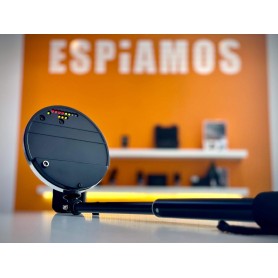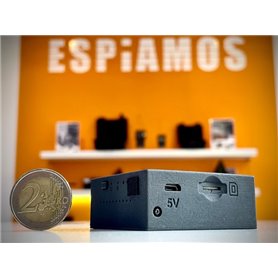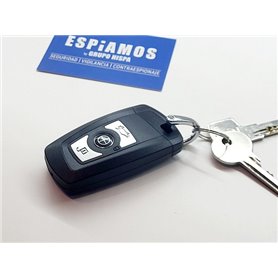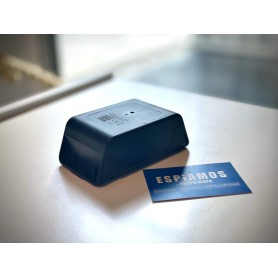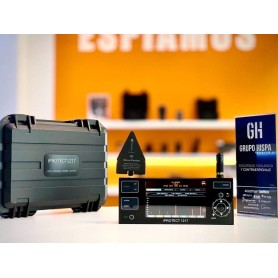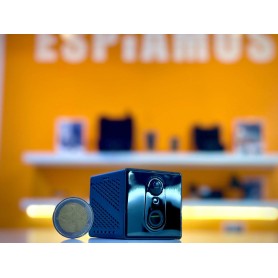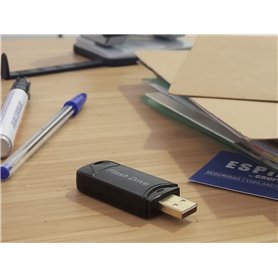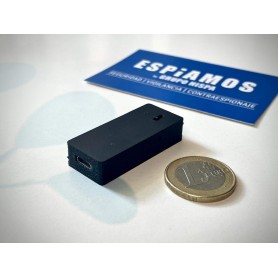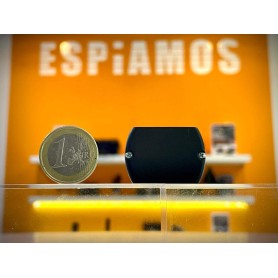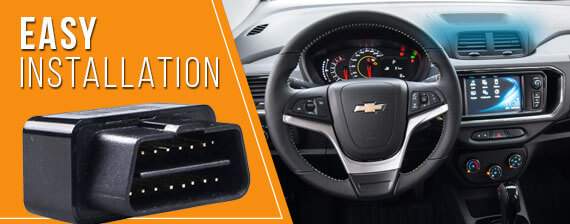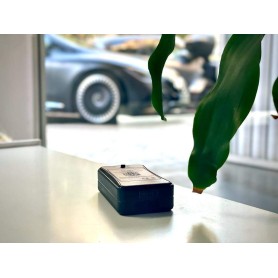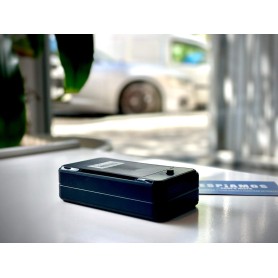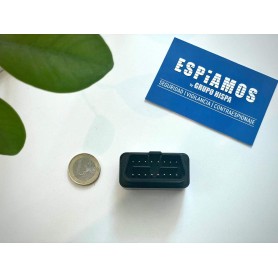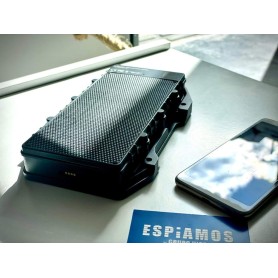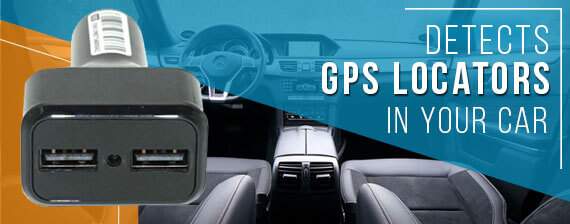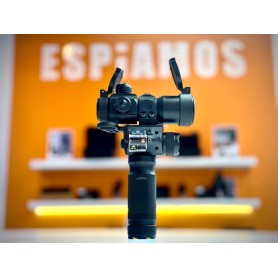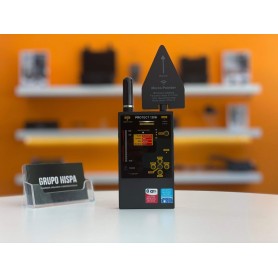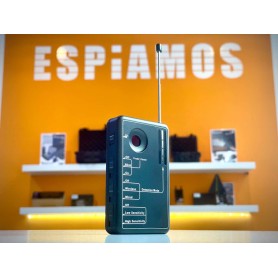Welcome to ESPIAMOS.COM: Your Spy Articles Store for Security, Surveillance and Counterespionage
We are proud to offer a range of high quality spy items that come with a 3 year guarantee, ensuring your investment is protected for the long term. Additionally, we strive to offer the best prices on the market, ensuring you get the most value for your money. And if that wasn't enough, we also offer free shipping on all our products, so you can receive your spy items quickly and without additional costs. This is all part of our ongoing commitment to customer satisfaction and service excellence.
Our Spy Products
Spy Cameras
The
spy camera is one of the most popular product categories that we offer at Espiamos. This hidden camera can be useful in a variety of situations, from home security to workplace monitoring. We offer a wide range of spy cameras to meet your specific needs, including the
mini spy camera that can be easily hidden, even camouflaged cameras in everyday objects such as a pen, glasses or
spy keychain.
Counterespionage and Electronic Countermeasures Products
At Espiamos, we understand that protecting your privacy is essential. That's why we offer a full range of counterespionage and
electronic countermeasures to help you safeguard your personal and professional information. From the hidden camera and microphone detector to the NLJD non-linear detector, we have everything you need to protect yourself against unwanted spying.
Technical Surveillance Teams
Our technical surveillance equipment is ideal for those who need to monitor a specific location, whether at home, work, or anywhere else. We offer a variety of surveillance solutions, from security cameras to alarm systems and GPS trackers. All our surveillance equipment is designed to be reliable and easy to use, giving you the peace of mind you need.
Why should you use spy products for covert surveillance?
Importance of Covert Surveillance for Personal and Property Security
Covert surveillance has become a necessity in today's society. In a world where personal and property security can be threatened, covert surveillance products can provide an additional layer of protection. These devices allow you to discreetly monitor your surroundings, providing you with the information necessary to protect yourself and your loved ones.
Use of Covert Surveillance in the Work Environment
Covert surveillance products are also useful in a work environment. The
wifi spy camera allows employers to ensure security of the workplace, protect company assets and supervise employee activities. These devices can help prevent illegal or unethical activities, thus ensuring the proper functioning of the business.
Respect for Legality and Privacy When Using Covert Surveillance Products
Despite the advantages they offer, it is important to use covert surveillance products responsibly and legally. It is essential to take into account local and national laws regarding surveillance and respect for privacy. At Espiamos, we strive to provide our clients with the information and tools necessary to use our products ethically and legally.
We spy, who are we?
History of ESPIAMOS
Espiamos is a company specialized in the sale of surveillance, security and counterespionage equipment. Founded more than 12 years ago, we have grown from being a website to becoming one of the leaders in the online security and surveillance market that participates in the most important international fairs in the sector such as Tecnosec or Feindef. Our company distinguishes itself by offering customers high-quality, state-of-the-art products to cover all their security needs.
Our mission and vision
Our mission at Espiamos is to provide our clients with the tools and knowledge they need to protect what matters most to them. We strive to be the leading provider of spy equipment for security and counterintelligence, offering the highest quality products and the best customer service. Our vision is a world in which every person has the tools they need to feel safe and protected.
3 years warranty and best price guaranteed
At Espiamos, we are committed to total customer satisfaction. This means not only providing the highest quality products, but also offering excellent customer service. So much so that we guarantee the best price and offer a 3-year warranty on all our products. We are here to help you select the products that best fit your needs, answer all your questions, and make sure you are completely satisfied with your purchase. We also take your privacy and security very seriously, and you can trust that all your transactions with us will be secure and confidential.
Why should you buy a NJLD frequency detector or nonlinear detector?
Use and functionalities of the frequency detector
The
frequency detector is an essential tool for anyone who want to protect your privacy and security. These devices can track and identify radio frequency signals emitted by different types of electronic devices, such as hidden cameras, spy microphones, GPS trackers, among others. Therefore, they are essential to identify possible threats to privacy in a certain space. They can be used in a variety of scenarios, including the home, office, a vehicle, or any other place where you want to protect information and maintain privacy.
Benefits of having an NLJD nonlinear detector
A
NLJD nonlinear detector, on the other hand, is a specialized device used to detect hidden electronic devices, regardless of whether they are transmitting or not. It does this through semiconductor component identification, which means it can detect a spy camera or microphone even if it is turned off. Having an NJLD detector provides an additional layer of security as it can detect electronic devices that a frequency detector might miss. This type of device is especially useful in high security situations where an extra level of protection is required.
Cases in which a frequency detector is essential
There are many scenarios in which a frequency detector may be indispensable. For example, if you suspect that someone may be monitoring you with a
spy phone, A frequency detector can help you discover if there are surveillance devices in your home or workplace. They are also useful for security and counter-surveillance professionals, as they can use these devices to secure a space before a confidential meeting or important event. Additionally, they can be used in private investigations or law enforcement operations to detect illegal use of surveillance devices. The frequency detector together with the
lens detector is An essential tool for anyone who values their privacy and security.
Do you know how to detect a spy device? Do you need TSCM Electronic Countermeasures Training?
A
TSCM electronic scanning (Technical Surveillance Counter-Measures) It is an exhaustive process that seeks to detect and neutralize any surveillance or technical espionage device that may be hidden in a specific area, such as a vehicle, an office or a home. This process can be complex and requires specific technical knowledge, as well as the use of specialized equipment. At Espiamos, we not only offer the necessary equipment to carry out these sweeps, but we also provide training in TSCM so that you can learn to carry out these processes effectively and safely.
TSCM Electronic Countermeasures Training
TSCM electronic countermeasures training is essential for anyone looking to improve your personal or business security. This training will provide you with the necessary skills to detect, locate and neutralize spy and surveillance devices. At Espiamos, we have highly trained personnel and technical knowledge to teach these courses. Our training covers topics such as locating hidden devices in cars, offices, among others.
TSCM Sweeping Service
If you do not have the time or knowledge necessary to carry out a TSCM sweep on your own, at Espiamos we offer a professional sweeping service. Our team is made up of highly trained professionals with extensive experience in detecting and neutralizing spy and surveillance devices. We use state-of-the-art equipment and effective sweeping methods to ensure your space is free of any spy devices. The security and privacy of our customers is our top priority, and we are committed to providing the highest quality service.
Why is it important to use a spy camera?
Common uses of spy cameras
The
4G LTE spy camera is a very versatile tool that They can be used for a variety of purposes. They are often used for home or workplace surveillance, allowing users to monitor the security of their property and protect against theft or vandalism. They can also be useful for parents who want to keep an eye on their children or those in charge of caring for them, such as babysitters or caregivers. Additionally, in the business environment, they can be used to monitor productivity, prevent employee theft, and ensure integrity in the workplace.
Security and surveillance with spy cameras
In terms of security, spy cameras are a great way to keep a constant record of what is happening in a specific location. This can be particularly useful in situations where evidence is needed, such as in the case of a crime committed on property. Being so discreet and difficult to detect, hidden cameras are an effective option for capturing suspicious activity without alerting the person being recorded. In situations where personal safety or property protection is a concern, spy cameras are an invaluable tool.
The legality and ethics of hidden cameras
Although the
hidden camera can be very useful, it is also It is important to consider the legal and ethical issues associated with its use. In many places, there are specific laws that regulate when and how spy cameras can be used, and failure to comply with these laws can result in legal penalties. Additionally, hidden camera use must be done in an ethical and respectful manner, protecting the privacy of individuals and using recordings only for their intended purposes. Therefore, before installing a spy camera, it is always advisable to research local laws and consider the ethical implications.
When should I use a spy recorder?
Situations in which a spy voice recorder is useful
The
spy voice recorder is an extremely useful tool in a variety of situations. For students, they are great for recording lectures or study notes, allowing for easier review later. For journalists and writers, they can be essential for recording interviews and ensuring that no information is lost. They are also useful in the business world, where they can be used to record meetings, seminars, talks and presentations. Additionally, in certain legal cases, a voice recorder can be invaluable in documenting important interactions and conversations.
Spy recorders for professionals
In the professional field, the spy audio recorder is an indispensable tool. For lawyers, they can be used to record statements, testimonies and legal conversations. Doctors and other healthcare professionals can use them to record medical notes or dictate reports. Journalists and writers, as mentioned above, regularly use them for interviews. Even in the world of art and music, voice recorders are used by musicians and songwriters to capture song ideas and melodies in the moment.
Legal aspects of voice recording
Although spy audio recorders can be incredibly useful, it is also important to consider the legal aspects of their use. Laws regarding voice recording vary significantly from place to place, and in some cases, it may be illegal to record a conversation without the consent of all parties involved. Additionally, even if the recording is legal, using it in an inappropriate way, such as defaming someone or violating their privacy, could have serious legal consequences. Therefore, it is always important to research local laws and use voice recorders responsibly and ethically.
When should I buy a Spy GPS locator?
Practical applications of GPS locators
A
GPS locator has endless practical applications. From protecting valuables to tracking vehicles and people, they are a powerful tool to increase security and peace of mind. The
GPS beacon or magnetic GPS locators< /strong> can be useful for businesses that need to track their fleets of vehicles or expensive equipment, as well as parents who want to keep their children safe. GPS locators are also ideal for tracking pets, in case they get lost or go out for a walk alone. Additionally, for people who engage in hiking, camping, or outdoor sports in remote areas, a GPS tracker can be a lifesaver.
GPS locator for vehicles and people
GPS is particularly useful for tracking vehicles and people. For vehicles, they can provide greater security by allowing owners to track the location of their car if it is stolen. Additionally, they can be a valuable tool for companies that need to track and manage fleets of vehicles. As for people, GPS trackers can be a vital tool for personal safety, especially for children, the elderly, and anyone who may be at risk. They can allow parents to know where their children are, or caregivers to track elderly people who might become disoriented.
Choose the correct GPS locator
Choosing the right GPS tracker depends on your specific needs. For example, if you need a tracker for a vehicle, you'll want one that is durable, waterproof, and has a long battery life. It may also be useful to have features such as geofence alerts, which alert you if the vehicle leaves a specific area. For people tracking, you may want a lighter, more compact device, possibly with features like an SOS button for emergencies. It is also important to consider the quality and reliability of the GPS tracking service, as well as any charges or monthly fees associated with using the service.
Ethical aspects of Espiamos
Our stance on privacy and security
At Espiamos, we consider the privacy and security of our clients as our mtop priority. We take the protection of your data very seriously and ensure that all transactions and interactions with our website are secure. Our team constantly strives to ensure that all of our products and services meet the highest safety standards.
How Espiamos promotes the responsible use of its products
We promote the responsible use of our products through education and guidance. We understand that our surveillance and counterespionage products can be very powerful tools, and we make sure our customers understand the importance of using them ethically and legally. We provide detailed information on each product and are always available to answer any questions you may have about the correct use of our equipment.
Espiamos' commitment to laws and regulations
We are committed to complying with all relevant laws and regulations in all aspects of our business. This includes respecting privacy laws, selling products that comply with all applicable regulations, and ensuring that our products are only used legally and ethically. We always strive to keep up to date with changes in laws and regulations to ensure that our products and business practices remain in full compliance.
What makes Espiamos different from another spy store?
Customers choose Espiamos for various reasons. The high quality and reliability of our products are key factors. Unlike another spy store that might offer earpieces or parental control software, products that are legal but highly questionable from an ethical point of view, at Espiamos we make sure to only market products that are both ethical and legal. For this reason, our brand prefers to teach how to detect a penguin than to market it. Additionally, our focus on customer satisfaction and our commitment to exceptional after-sales service are elements that set us apart. We have a customer service team always available to address any queries, issues or concerns, ensuring every customer has a positive experience.
Our commitment to quality and customer service
At Espiamos, quality and customer service are not just buzzwords: they are the basis of everything we do. Our commitment to quality is reflected in every product we sell, and our team strives to provide exceptional service with every interaction. We believe our customers deserve the best, and we strive to exceed their expectations every step of the way.

